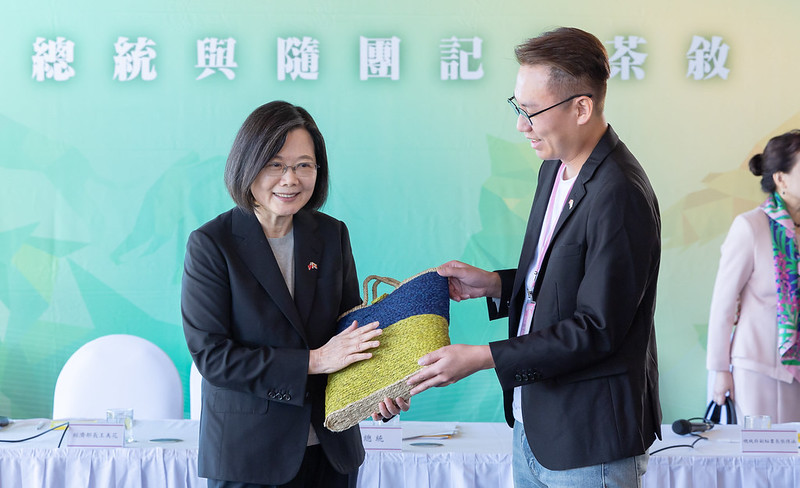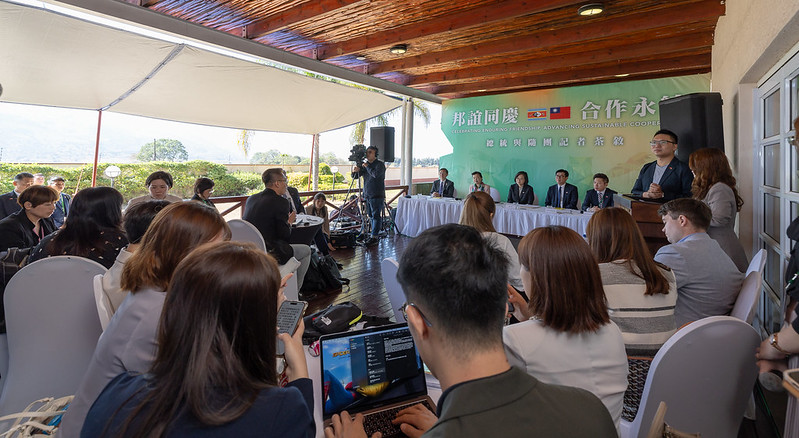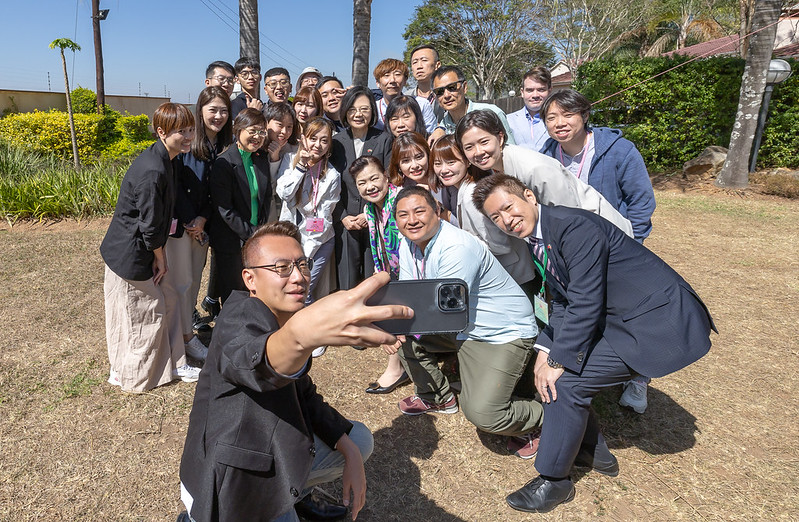News & activities
 News releases
News releases
On the morning of September 7 local time (afternoon of the same day Taipei time), President Tsai Ing-wen held a reception at her lodgings in Eswatini for the press corps traveling with her delegation. The president shared the results of the trip and responded to media questions about diplomatic relations, the Africa Project, regional developments, domestic affairs, and other topics.
A translation of President Tsai's remarks follows:
This afternoon we will all depart for Taiwan, and I want to thank you for your hard work over the past few days. This was my second trip to Eswatini, five years after my first visit. After those five years, everyone can see the results of our bilateral cooperation in many areas.
Yesterday we saw an example of our cooperation when we visited the Referral and Emergency Complex of the Mbabane Government Hospital, the renovation of which is the result of our joint efforts and of our countries overcoming many challenges. We renovated a 100-year-old building, modernized its facilities, and stationed Taiwan's medical mission there. The Taiwan Technical Mission is also conducting many cooperative agricultural programs in Eswatini.
During this trip, we have seen the growing confidence of our colleagues at the embassy and of members of our technical and medical missions. They have a sense of mission to achieve even greater progress in our diplomatic work.
From our trips abroad over the past year, whether to Guatemala and Belize, or Vice President Lai Ching-te's visit to Paraguay, or this trip to Eswatini, I am sure that everyone in the traveling press corps has felt the sincere friendship between Taiwan and our allies, as well as how much our friends in those countries value and support Taiwan.
Especially over the past two years, many government officials and new heads of state from our diplomatic allies have visited Taiwan. Our people's free and open lifestyle and Taiwan's stable economic development have made a deep impression on them.
I also want to take this opportunity to thank our colleagues at the Ministry of Foreign Affairs (MOFA) for their dedication. I know they have all done their utmost, including making very early preparations, and that some colleagues have come to Eswatini from other diplomatic postings to provide support. Over the past few days, I have repeatedly emphasized that diplomatic achievements are cumulative. Taiwan's diplomatic corps has been able to continue passing the baton, because each generation fosters the next with extensive experience that fortifies our future diplomatic efforts. That experience is the cornerstone of Taiwan's ability to maintain its presence on the international stage.
Going forward, we will continue working to expand the breadth and depth of Taiwan's diplomatic efforts. Once again, I want to thank all of our friends in the traveling press corps for your reporting, doing your best to report what you have seen so that more citizens can learn about Taiwan's diplomatic efforts. Thank you for your hard work.
Responding to a question from the media regarding whether she is concerned that China will continue to influence our diplomatic allies and whether or not she will have an opportunity to make a trip to Europe, President Tsai said that relations with all of our existing diplomatic allies are stable. She noted that this is especially true for Eswatini, which has long been a steadfast ally of Taiwan, adding that over the past few days everyone has witnessed the robust friendship between our two countries. The president also thanked Eswatini for the invitation to participate in the double celebration marking both the country's 55th year of independence and the 55th birthday of King Mswati III, saying that it allowed her to make another trip to Eswatini before leaving office and to witness the achievements and progress of our bilateral cooperation. One example, she mentioned, is the Mbabane Government Hospital everyone had visited the previous day, which was a construction site five years ago but is now where our highly efficient medical mission is stationed. The president then said she was delighted to engage in mutual assistance with our ally and friend.
President Tsai noted that Taiwan's international visibility and support for Taiwan in the international community have increased significantly over the past few years, and that there is a very clear and broad consensus in countries around the world for maintaining peace and stability in the Taiwan Strait. The president pointed out that Taiwan is now widely considered in the international community as a stable, reliable, and a trustworthy partner, and that Taiwan, as a force for good, has not only been acknowledged by international political leaders, but has also made a deep impression on people from around the world. These achievements, she noted, are the result of collective efforts. As for travel plans during her remaining term of office, the president said she believes that if there is a need, if it is good for Taiwan, and if it is an appropriate opportunity, then there will be a visit, but that there will not be a visit just for the sake of making a visit.
Asked whether she would attend this year's APEC Economic Leaders' Meeting in person to overcome the limitations on Taiwan's international participation, President Tsai responded by saying that every president would like to break this precedent set when APEC was founded, and that we will of course continue in our efforts, but that it is, indeed, a formidable challenge that we are taking one step at a time. The president said that this year we will continue to follow precedent by sending a leader's representative to attend, and that we will inform everyone after the arrangements have been made.
Asked whether there was any competition intended by her current trip abroad, which comes after China's President Xi Jinping attended the recently concluded BRICS Summit in South Africa, President Tsai replied that every trip abroad is scheduled long in advance, and is not a spontaneous idea. She added in particular that the priority for this trip is Eswatini's independence day, which the country celebrates on September 6, and that the date does not change, so there is no need to read too much into the timing of the trip.
Asked whether she expects to make any diplomatic breakthroughs during her last months in office and if there is a chance for further exchanges with other countries in Africa, President Tsai pointed out that in addition to Eswatini, Taiwan has representative offices in several other African countries, and that 11 countries and over 80 legislators from both ruling and opposition parties in Africa issued a joint statement of welcome for this trip. She said that this is the result of efforts by our diplomatic staff in various countries over the past few years.
President Tsai noted that Eswatini's King Mswati III mentioned that many political leaders from African countries had asked him about, and expressed interest in, Taiwan's affairs. That, the president explained, makes it clear that increasingly more people in Africa are becoming interested in Taiwan, and that they are paying more and more attention to Taiwan. She said that we are willing to interact with them to help everyone better understand Taiwan, and that we will look for opportunities to cooperate and develop substantive relations.
One media member asked whether the president thinks Taiwan-related issues will be considered important matters of concern at the G20 Summit in India this month, like they were at the last G7 Summit. This was accompanied by two follow-up questions: whether this is an idea that the president has always wanted to convey to the international community and how the administration's team can convince people and make them more amenable to this way of thinking over time. President Tsai responded by saying that the G20 is still in its preparatory phase, so it is hard at present to comment on its future development. In addition, she said, Taiwan Strait issues have indeed received much attention over the past several years, being elevated from the cross-strait level to the Indo-Pacific regional level and becoming a global focus. The president said she believes that peace and stability in the Taiwan Strait has a strong global consensus, which is that no single party can unilaterally change the status quo.
President Tsai went on to say that Taiwan has gained in importance in recent years and in several areas: First, Taiwan has taken on an increasingly prominent geostrategic role, one that becomes more important especially as the overall situation in the Indo-Pacific changes. Second, she said, Taiwan holds such a key position in international supply chains that even a slight change in circumstances will affect global supply chain stability. Third, she added, Taiwan's democratic achievements have indeed already become benchmarks for democracies around the world, and the people of Taiwan have shown their determination to defend democracy and freedom, which has given the whole world reason to see the importance of working together to safeguard democracy, thus increasing their willingness to assist Taiwan.
President Tsai noted that over the past eight years our core approach to governance has been clear – stable development. The president explained that we seek development within stability, and that we have overcome various challenges as they came, one by one, with composure and sound measures. She said that the whole world has seen that we honor our commitments and work to maintain the status quo, and thus sees Taiwan as a reliable partner, as well as a good partner to work with in handling regional affairs and maintaining peace. She said that our position in supply chains and our geostrategic role have made the world value Taiwan's security even more, and that to protect Taiwan's democracy is to protect it as a universal value of the world.
Referring to what the president had mentioned earlier about the next president taking up the baton for the future of the Africa Project, a question was posed as to whether that baton could possibly be passed to Vice President Lai. President Tsai responded by saying that the Africa Project was designed to strengthen substantive relations with Africa during her term of office, and that with many members of the overseas community living in Africa, we already have foundations in various areas and are able to cooperate to develop substantive work related to Africa. She added that there is a transition process when a president leaves office, and that she will relay information about important issues to the next president. No matter who the next president is, she said, she will do everything she can to ensure that whoever receives the baton understands those issues.
President Tsai said that during this trip many political leaders from African countries came forward to express their support, which is also part of our work, and that she looks forward to improving and expanding the Africa Project. The president also said that she hopes MOFA will focus on taking the project to the next phase, and after completing a review, determine the next phase so that the next president can resume work on the project quickly. During that review, she explained, we will solicit ideas from members of our overseas community who are immediately involved in the issues to improve the plan for the future and facilitate its overall implementation.
Asked about the death by suicide of a lieutenant from the ROC Marine Corps' 99th Brigade, which his family has raised concerns about, President Tsai said that she is extremely concerned whenever anything happens to one of our brothers or sisters in the armed forces, and that she was greatly saddened by this incident. The president said she has directed the Ministry of National Defense to clarify the matter, that she will do everything possible to care for his family's emotional well-being, and that she will help with the subsequent arrangements.
Responding to recent reports that there will be minor cabinet changes, the president said that if there were adjustments to be made to the cabinet, she would discuss them with the premier, and that any changes to the team would be announced after confirmation.
Responding to a question about the ways China is interfering in elections in Taiwan, President Tsai said that attempts from across the Taiwan Strait to exert influence are on the rise, and the methods used are increasingly diverse. The president noted that cognitive warfare has been an important challenge for those of us in democratic societies, especially over the past few years. She emphasized that we must ensure that others do not use our democratic mechanisms to undermine our democracy, saying that this is also a test of the overall maturity of those mechanisms in Taiwan. She then called on the public to verify any questionable information, and when they confirm that it is disinformation, help to clarify it. She added that the government also has to take a major responsibility by clarifying disinformation as soon as it is discovered and providing better explanations to the public.
President Tsai pointed out that Taiwan's democracy is the culmination of the efforts of many generations, and is something precious that we must defend and protect. The president said that there are many challenges, especially during an election campaign, and that she hopes that everyone will remain vigilant and verify information of unknown origin, while reminding people around them to do the same.
Asked to comment on the 2024 presidential election, as well as Taiwan People's Party Chairman Ko Wen-je's (柯文哲) proposed coalition cabinet and suggestion that the president convene a national affairs congress, President Tsai said that elections are extremely challenging, and as the incumbent she believes that the public expects that after the election everyone will sort out their personal feelings, transcend party affiliations, and come together to communicate. Noting that her term of office as president expires on May 20, 2024, she said that she will do everything she can to help before leaving office.
Asked about the recent controversy regarding imported eggs, President Tsai said this is an issue for those with professional expertise, and that to vendors with knowledge of the industry, some of the international trade models they use may differ from our usual understanding of trade models for manufacturing products. She stated that both the Executive Yuan and the Ministry of Agriculture have issued detailed explanations over the past few days, and said she is confident that the process has been open and aboveboard and will stand up to scrutiny.
Referring to China's enormous influence in Africa over the past few years, one media member asked how Taiwan should deepen relations with African countries. President Tsai said that King Mswati III of Eswatini has told her that many African political leaders have expressed interest in understanding more about Taiwan. The previous day, she said, she also had an opportunity to meet and talk with political leaders from other African countries, all of whom expressed an avid interest in many of Taiwan's issues. The president noted that while it is true that China does have significant influence in Africa, African countries also hope to have other options so that their economies and other aspects of their external relations can include Taiwan. She said that we will therefore continue to communicate with them and seek opportunities for cooperation and for further substantive relations with Africa, both as a whole and as individual countries.
Regarding the approach of steadfast diplomacy she adopted after taking office in 2016, the president was asked how she hopes observers describe that approach after she leaves office eight years later. President Tsai responded by saying that MOFA has always emphasized steadfast diplomacy, adding that it will remain our core strategy and that she had just repeatedly emphasized advancing substantive relations.
Accompanying the president at the reception were Minister of Economic Affairs Wang Mei-hua (王美花), Overseas Community Affairs Council Minister Hsu Chia-ching (徐佳青), Kaohsiung Mayor Chen Chi-mai (陳其邁), Deputy Secretary-General to the President Xavier Chang (張惇涵), Deputy Minister of Foreign Affairs Roy Chun Lee (李淳), and Ambassador to the Kingdom of Eswatini Jeremy H.S. Liang (梁洪昇).












